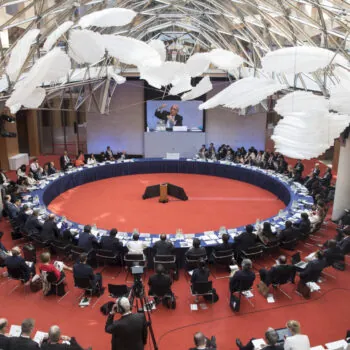On 6 December 2023, Germany published its first, cross-government “Climate Foreign Policy Strategy”. The strategy aims to bring coherence to Germany’s approach to the climate crisis across all international engagements. It is a positive first step in outlining an integrated and ambitious approach with valuable lessons for countries looking to pursue a similar vision. Implementation, however, remains unclear – further steps are crucial to ensure its effectiveness.
New challenges, new approach
To avoid the most devastating impacts of climate change, action taken in the coming years will be decisive. In parallel, the geopolitical situation is becoming increasingly complex. Coordination and coherence in how governments address climate as well as security, economic and development challenges is critical to their success.
Germany’s new strategy acknowledges this, providing a basis for climate to be considered in all of Germany’s diplomatic activities. The strategy highlights the right priorities, which include accelerating energy transition and drastically reducing GHGs; climate proofing the economy, protecting the vulnerable, restoring ecosystems, strengthening peace and security, and aligning financial flows with 1.5°C. It recognises Germany’s unique diplomatic strengths and abilities as an active multilateral player, diplomatic bridgebuilder and economic powerhouse.
While framed as a whole of government approach, not all coalition partners seem equally invested in the strategy. Finance fundamentally underpins its success, and the Finance Ministry will be essential here. It is concerning that parts of the government questioned maintaining Germany’s international climate finance commitments in light of the constitutional court debt ruling and subsequent hole in the budget (others were quick to assure these would remain untouched).
To maximise impact, implementation plans must be developed to ensure all coalition partners are accountable – domestic tensions should not impact how the strategy is taken forward.
The importance of partnerships
The strategy emphasises the importance of international partnerships, both bilateral, such as climate and development partnerships, and multilateral, such as Just Energy Transition Partnerships (JETPs) and the Climate Club. Work is needed to bring all partnerships in line with the strategy. A comprehensive evaluation next year provides an opportunity to underpin all partnerships with cross-government criteria to ensure this alignment.
The strategy is complimentary of JETPs. A vision on how to overcome their current challenges, as well as designing a new model for a more systematised approach are also needed.
Transforming finance
The international financial architecture (IFA) reform agenda is central to aligning global financial flows with 1.5°C and climate resilient development. The strategy promises more coherent engagement on reform but falls short of going beyond existing initiatives and delivering a cross-governmental vision.
It could also go further on international fossil fuel financing. The recently published climate guidelines from Euler Hermes showed welcomed ambition to end international finance for fossil fuels. However, the strategy continues to provide loopholes for financing gas projects abroad. This undermines Germany’s commitment to remain aligned with 1.5°C and its international commitment to the Glasgow Statement from 2021. The next step will be to provide climate related guidelines for KfW. This presents an opportunity to align all international investments with the 1.5°C target.
Implementing and monitoring
The strategy proposes a high-level cross-ministerial coordination group to support implementation. Specific responsibilities remain yet to be defined. Developing a concrete roadmap including performance benchmarks and timelines would enable accountability and robust implementation.
In addition, the creation of an independent advisory board, with representatives from civil society and academia, would be a positive step in line with the Strategy’s outlined “participatory climate foreign policy” approach. This, in combination with the coordination group, can embed climate action across foreign policy and ensure its longevity beyond the existing government’s legislative period.
A model for others?
Despite potential for improvement, the German Climate Foreign Policy Strategy provides a useful outline of principles underlying ambitious, coherent, comprehensive climate diplomacy. As such, it holds many lessons for other climate ambitious nations.
2024 US presidential elections mean that the United States’ role in international climate diplomacy will be constrained next year. The EU will largely be preoccupied with their mid-year Parliamentary elections. Having just released the Climate Foreign Policy Strategy, Germany is well placed to take the lead in pushing forward EU-wide climate foreign policy to maximise its impact by supporting decarbonisation and strengthening resilience worldwide.
But first, action must begin at home. It is critical that the government follows up quickly with concrete implementation plans. Otherwise, there is a risk that this Strategy will remain nothing more than aspiration.


